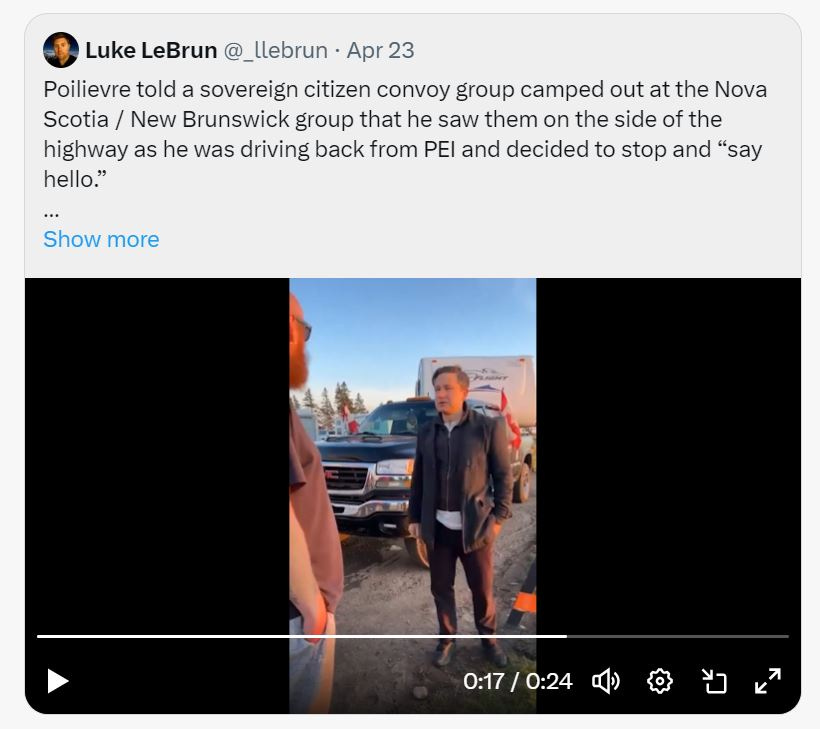Revealing Pierre Poilievre’s game plan
Why Conservatives are courting the far-right, and workers
Conservative Party Leader Pierre Poilievre’s roadside chat with protesters in the Maritimes this week has raised plenty of questions about the party’s political game plan.
As Press Progress editor Luke Lebrun described the meeting, “Poilievre told a sovereign citizen convoy group camped out at the Nova Scotia - New Brunswick [border] that he saw them on the side of the highway as he was driving back from PEI and decided to stop and ‘say hello.’ ‘Everyone’s happy with what you’re doing,’ Poilievre says.”
With the latest polls putting the Conservates well in the lead, over 20 percentage points ahead of the Liberals, you might wonder why he would be courting voters associated with anti-vaccine mandate, conspiracy-theory and straight-out extremist groups such as Diagalon.
One of our favourite podcasts, CBC Front Burner, asked journalist Justin Ling to explain. The conversation delved into how radical sentiments have permeated mainstream discourse, with symbols like "F Trudeau" flags appearing widely. Ling explained how extremist ideologies influence broader movements, including the anti-carbon tax protests.
Of course not everyone who dislikes Trudeau is influenced by extremist views, Ling stressed the significant impact of far-right groups on political discourse. He highlighted Pierre Poilievre's role in amplifying these sentiments for political gain.
Pierre Poilievre looked at that rump of people and thought to himself, they are going to be very important for me within the leadership and for me becoming prime minister.
Journalist Justin Ling
“Pierre Poilievre, from the very kind of beginning of his leadership aspirations, has identified this particular strain… the 8 to 10% who are radically against the prime minister, who might be susceptible to the idea that he's committed treason, or that he encouraged vaccines that killed scores of people, right, whatever,” said Ling. “Pierre Poilievre looked at that rump of people and thought to himself, they are going to be very important for me within the leadership and for me becoming prime minister.”
Union members
While courting this fringe group of voters, Poilievre and his strategists have been careful not to alienate another, much larger group of voters: union members.
Toronto Star columnist Linda McQuaig pointed out this week that Pierre Poilievre was once the most anti-union politician in Parliament. Things have changed.
“There he was in Parliament last February, voting in favour of pro-labour legislation banning scabs in federal workplaces,” she writes. “Has he fundamentally changed his thinking — or was that simply part of his new, air-brushed ‘friend of the working man’ look?”
Myself, I was speaking with a colleague in the labour movement the other day who expressed surprise and frustration that his union’s rank-and-file members were so prepared to vote Conservative in the next federal election. “It’s a desire for change,” he told me. “They are tired of Trudeau.”
Appearing on the Toronto Star’s podcast, It’s Political, pollster David Coletto said 85% of voters are looking for change. “The Conservatives have been spending millions and millions of dollars introducing their leader and telling a story about why change is needed, and in the absence of the NDP having the resources to compete, it hasn’t been an equal playing field,” he said.
85% of voters are looking for change.
David Coletto, Abacus Data
McQuaig places some of the blame on the media, arguing that the journalists have not been doing a good job explaining Pierre Poilievre to readers and voters.
But as Ling sees it, the influence of professional journalists has waned in the age of social media. “We no longer have a public discourse where newspapers and TV channels and think tanks are primarily driving the bus,” he said. “So this does have a real consequence.”
Uneasy coalition
Still, the election is over a year away, and a lot can happen.
“Poilievre and Conservative strategists know it’s going to be tricky keeping the support of the two very different factions backing him — the small hard-core right that is his base and the millions of centrist Canadians mostly interested in getting rid of Trudeau,” said Linda McQuaig.
Can the NDP recapture the anti-Trudeau voters? Will membership-based groups like unions, civil society organizations and environmental groups be able to debunk Conservative messaging directed at their members?
Then, there is the impact of the U.S. election this fall. Should a second Trump administration win, might it drive Canadian voters away from his Conservative ideological bedfellows north of the border?
Unfortunately, given the current political direction in Canada, the Trump factor in the United States might play a big role in our federal election in 2025.
If you found the article interesting or informative, please like, share or leave a comment.
Special offer for new paid subscribers
“I feel that it is a fundamental responsibility of anyone who is an elected official... to collaborate with other orders of government to be able to make sure that health care works,” former health minister Jane Philpott told the Hill Times.
Jane Philpott joined the Hot Room podcast to talk about how to fix Canada's ailing primary health systems, and her new book, "Health for all: A doctor's prescription for a healthier Canada."
Listen to the Hot Room
https://www.hilltimes.com/podcast/jane-philpott-on-how-to-fix-health-care/
Claim your free book
When you become a paid subscriber to PeaceQuest at $5.50 per month, or $55 per year (a 17% savings), you can claim a free copy of Dr. Jane Philpott’s “Health for All: A Doctor’s Prescription for a Healthier Canada,” released last month (hardcover, a $35 value).
Did you miss last week’s newsletter?
Thank you for everything you do for peace,
Steve








